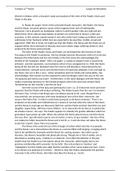Tuesday 12th March Caspar de Wesselow
Women in Bodas: write a character study and analysis of the roles of the Madre, Novia and
Mujer in the play
In ‘Bodas de sangre’ three of the principle female characters, the Madre, the Novia
and the Mujer, are given generic names which suppress their lack of individuality.
Moreover, Lorca presents an Andalusian culture in which gender roles are rigid and pre-
determined. Strict cultural expectations of gender are connected to honour, pride and
economy. In this context a good woman is one who works hard, brings up children and is
submissive to her husband, whilst men are expected to be assertive, mobile, proud and
aggressive. With this in mind, we might say that the Madre, the Novia and the Mujer are all
trapped within the framework of the play and must endure tragic suffering similar to that
endured by the Novio and Leonardo.
The fates of the Madre, Novia and Mujer are all dictated by the fortunes of men.
Focusing on the Madre in particular, she has already become the passive victim of a clan war
between the Félix family and her own family. In the first scene she acknowledges the
sterility of her husband’s death, ‘Miré a tu padre, y cuando lo mataron miré a la pared de
enfrente’, and the repressive, rural existence which it has consigned her to. With the Novio
being all she has left, her idealised vision for how he will develop is characterised by her
overprotection, constant worry and reinforcement of machismo attitudes in his marriage to
the Novia. Her son is like a ‘toro’, which symbolises both his virility and vulnerability. She
acknowledges that women are less exposed to external dangers when she says to her son,
‘me gustaria que fueras una mujer’. Furthermore, in the same dialogue with the Novio she
makes a damning reference to the limited prospects which she and most women hold;
‘bordaríamos las dos cenefas y perritos de lana’.
Over the course of the play and particularly in Act I, sc. iii it becomes more and more
apparent that the Madre will endure suffering. The Madre boasts that her son (‘un hombre
hermoso’) has, ‘la honra más limpia que una sábana puesta al sol’, even though this is a
characteristic not synonymous with most Andalusian men of the time. Moreover, she
assures the Padre that, ‘mi hijo la cubirá bien [porque] es de buena simiente’. There’s an
emphasis on fecundity and motherhood as a means of survival when the roles of the Novio
and the Novia in marriage are discussed. Both her and the Padre envision that their son and
daughter respectively, will have many children; ‘es la roturación de las tierras, la plantación
de arboles nuevos’, she says. The Madre appears to embody the gender attitudes which her
generation have grown up with. When she advises the Novio about how to treat the Novia
she says that, ‘que ella sienta que tú eres el macho, el amo, el que mandas’. Her loss of her
son makes her bitter towards the Novia and in Act III, sc. ii and she does not allow the Novia
to join her in grief, ‘Llora. Pero en la puerta’.
The Novia is the central force of the triangle of action which also ties in Leonardo
and the Novio. Lorca characterises the Novia as a woman filled with longing; a longing which
fails to be satisfied by Leonardo and the Novio for varying reasons. Like other Lorcan
heroines, the Novia is beautiful and physically strong. Though she is full of vitality, she is
described as wasting away, ‘metida en un desierto’. Her initial introduction in the play
implies that the Madre has reservations about her character, albeit largely due to her
previous relationship with Leonardo ‘de los Felix’. She is described as ‘modosa’ and
‘trabajadora’ but the Madre also adds that the mention of her name makes her feel, ‘como
si me dieran una pedrada en la frente’. Similar to how the Madre emphasises the positive
character traits of the Novio, the Padre describes the Novia as, ‘ancha’.





